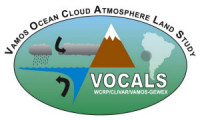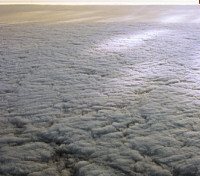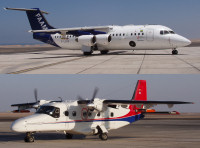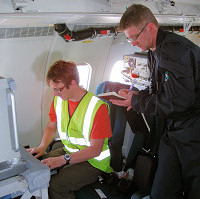VOCALS-UK field measurements get underway.

Nine scientists from the University of Manchester Centre for Atmospheric Science are currently on detachment in Arica, Chile to participate in the VOCALS-UK field project in conjunction with scientists from the University of Leeds, the UK Met Office, FAAM and ARSF.

The VOCALS-UK project let by Professor Hugh Coe from the University of Manchester and Dr Phil Brown from the UK Met Office aims to investigate how the vast cloud systems off the coast of Chile and Peru affect the Earth's climate. The clouds are marine stratocumulus which usually occur near land where deep, cold, upwelling water reaches the surface of the sea. This water cools the surface air, resulting in condensation and cloud formation. The clouds do not exceed 2km in altitude, and they are present nearly all year round in the South-East Pacific region and cover an area of ocean often larger than the USA. Marine stratocumulus are important to the climate because they reflect sunlight back into space cooling the ocean below. However current representation of these systems in global climate models is poor.

The VOCALS project will measure the properties of these clouds, using cloud and aerosol instrumentation mounted on two research aircraft which will be flown through the cloud as well as the air above and below cloud. The FAAM BAe-146 will mostly fly through the cloud or in the layers immediately above or below, while the ARSF Dornier 228 will fly high above the cloud to make remote sensing measurements using instruments such as LIDAR and spacially resolved spectral radiometers. This data will help scientists to understand how the systems form, how reflective they are, and what factors determine how long the clouds last. The UK team will also be hoping to establish whether pollution from mining and other actives along the Chilean and Peruvian coasts affect the clouds' properties. Measurements will determine whether heavily polluted clouds produce different amounts of rain, or have different reflectivity than clouds formed under clean conditions. Ultimately the data gathered coupled with detailed modeling studies will be used to improve the accuracy of the climate models. The VOCALS-UK project is being carried out as part of a US led international project involving over 200 scientists from around the world. In total during the six week measurement period measurements will be made on five research aircraft, two ships and a number of ground based platforms.

The Manchester team who will be in Chile for approximately 4 weeks are responsible for maintaining and operating a suite of cloud and aerosol instrumentation on the FAAM aircraft, a LIDAR and some in-situ aerosol instruments on the Dornier and flight planning and mission science duties for both aircraft.
More information about the VOCALS project may be obtained from the following websites:
http://www.cas.manchester.ac.uk/resprojects/vocals/ - CAS Vocals Page
http://data.cas.manchester.ac.uk/vocals/index.htm - VOCALS-UK Consortium Web Pages
http://www.eol.ucar.edu/projects/vocals/ - International VOCALS Project Site
A news article featured on the BBC website may be found here:
http://news.bbc.co.uk/1/hi/sci/tech/7682836.stm
A project blog with contributions from UK participants including those from the University of Manchester may be found here:
http://planetearth.nerc.ac.uk/blogs/story5.aspx
Project postcards contributed mainly by US scientists along with introductory information about the project may be found here:
http://www.windows.ucar.edu/tour/link=/vocals/vocals_intro.html&back=/search/search_navigation.html&edu=mid